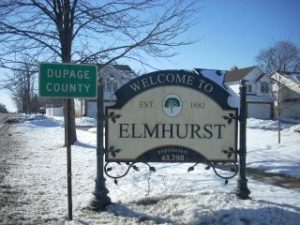 Virgils seek allowance to keep membrane structure in yard, court fees
Virgils seek allowance to keep membrane structure in yard, court fees
By Dee Longfellow
For The Elmhurst Independent
Late last week, the Independent learned that on March 23, a complaint for administrative review was filed by Nicole and Dan Virgil in the DuPage County Circuit Court against the City of Elmhurst over the hoop house located on their property that City officials have deemed illegal because it is against the City’s Building Code.
A hoop house is a membrane building of sorts that is placed over, in this case, a garden to keep the elements out. It is designed to stretch the growing season so that it can begin a few months earlier and last longer at the end, since the usual weather in state of Illinois requires calling it quits by early to mid fall.
An administrative hearing officer determined that the City should compel the Virgils to remove a membrane component of a garden, or “hoop house,” in their yard because the membrane is not allowed under the City’s Zoning Ordinance. The suit alleges that the membrane is not governed by the Building Code and that the City’s direction to remove it relies on the Building Code.
The Virgils developed a large plot in the yard behind their home to engage in “recreational gardening.” Roughly between late October of 2015 to late March 2016 and between October 2016 through late February of 2017, they have used a membrane over a portion of their garden plot to extend the growing season and to preserve the plants under the soil.
The membrane, while not permanently affixed to the ground, is made of wood, PVC and a collection of straps and bands that hold it in place over the garden while being fully able to be removed and re-installed.
On February 28, 2017, the hearing officer said the Plaintiffs had violated certain sections of the Zoning Ordinance, leading the officer to order the removal of the membrane.
The Virgils property, located on the 500 block of So. Fairview, is located in a R-2 Single Family Residential District, which imposes a 30% maximum lot coverage. The buildings on the property cover about 2,600 square feet of the 8,812.5 total square feet, not including the membrane structure. This means the lot is at the maximum coverage of 30%. According to the hearing officer, the additional 30 square feet of the membrane makes the lot coverage 33.6%, exceeding the maximum allowed.
What the Virgils are seeking is the ability to keep the membrane hoop house on their property seasonally. They are also seeking attorneys fees and court costs.
The City’s finding argues that the ordinance they are relying on is not relevant to this structure. The agreement is that if it IS relevant, there are other “membrane” structures such as trampolines, tents, pool covers, sport courts, which are allowed because they fall under the definition of “recreational equipment.” The hoop house does not count because it doesn’t protect people, it’s strictly to keep the ground warm. The suit contends that gardening is. Recreational activity and that, therefore, the hoop house should be allowed.
The outdated dictionary argument
One of the arguments in the complaint is that terms like recreational use, accessory building, and others were defined in the Zoning Ordinance using a Random House Dictionary published in 1987. The suit indicates that the neither the City Clerk nor the Building & Zoning office at the City have this edition of the dictionary. The 1987 dictionary could not be found at the Elmhurst Public Library, the Elmhurst College library, or the County law library located in Wheaton. A copy of the dictionary was finally found in Glen Ellyn.
The suit alleges that since the dictionary defining the terms is from 1987 and cannot be found in Elmhurst, using the Zoning Ordinance is unfair to the City and to its residents because it is so outdated.
What about other temporary tents and structures?
The suit points out that a section of the Zoning Ordinance refers to mobile homes, temporary tents and membrane structures that the ordinance says “shall not be considered to be permissible as an accessory building.” However, it reads, tent and membrane installations were installed at various locations around the City during the Chicago Cubs recent historic run to win the World Series. It also notes that retailers like CVS and Jewel have put up temporary structures in their lots in spring to sell plants and flowers and sometimes in winter to be able to offer Christmas trees. This represents an inconsistency in enforcement, according to the suit.


